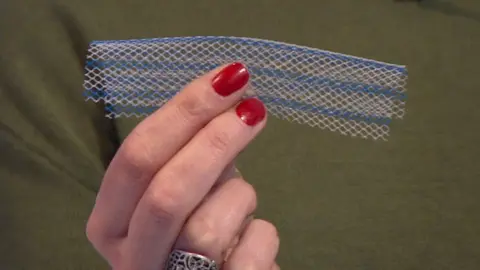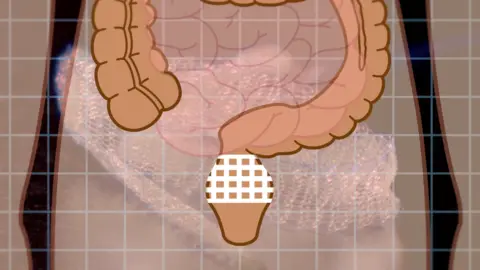Mesh surgeon investigated by NHS trust in Bristol
 BBC
BBCA surgeon who carried out mesh surgery that left women in severe pain is being investigated by his NHS trust.
Tony Dixon, who is based in Bristol, uses a technique known as mesh rectopexy to fix bowel problems, often caused by childbirth.
Several women are considering legal action after being treated by him.
Mr Dixon said he was unable to comment because of the investigation, but the BBC understands he denies doing anything wrong.
He works at Southmead Hospital and at the Spire private hospital in Bristol.
One of Mr Dixon's patients, Sam van der Heijden from Hastings in East Sussex, said she was left with major pain and complications after Mr Dixon inserted the mesh in 2011.
She had had previous surgery with someone else and was facing a difficult future.
"I researched on the internet and Mr Dixon came up as the pioneer of mesh rectopexy," she said.
"So I thought, right, if I'm having problems I need to go to the best.
"He said [it] will solve all your problems. Because I believed he was the expert I didn't question it."
Another surgeon told the BBC in their opinion her mesh was not attached where they would expect it to be.
Concerns have also been raised by patients who said they were not fully warned of possible complications.

Gynaecologist Dr Sohier Elneil has taken on the care of several patients from all over the UK who were operated on by Mr Dixon in Bristol.
"There might be patients in whom it has been absolutely fine, but we now know there are many patients who are suffering as a consequence of this type of surgery," she said.
"This year alone we've operated on seven such cases.
"It worries me when you start to hear the same name or same technique or the same problem in women from different parts of the country."
Mr Dixon is being investigated by Southmead Hospital, where he currently cannot perform mesh operations.
The General Medical Council (GMC) is also investigating, and has stopped him from performing another form of corrective surgery, known as a Starr procedure (stapled transanal resection of the rectum), for a year from August 2017.


Mesh implants are medical devices used by surgeons to treat pelvic organ prolapse and incontinence in women, conditions that can commonly occur after childbirth.
The mesh, usually made from synthetic polypropylene, is intended to repair damaged or weakened tissue.

Mr Dixon has his supporters, and the BBC has been told he is pioneering, experienced and conscientious.
The Pelvic Floor Society (PFS) says up to 2.5% of women who have mesh surgery will suffer complications, but it can bring life-changing benefits.
The society's Andrew Williams said it was "up to the woman herself" to discuss with her surgeon the "risks and benefits".
One surgeon told the BBC that complications arising from mesh surgery, a procedure which became common in about 2004, could not have been foreseen.
The PFS said it began to recognise complications in 2014, but its chair could not say whether surgeons should have mentioned complications before then.
Two Bristol law firms are considering legal action, after taking on 16 women who were operated on by Mr Dixon.
Madeleine Pinschof from Thompsons Solicitors said the majority had suffered "debilitating complications... far worse than before they had these procedures".
"Certainly we don't believe that all of the possible complications had been explained," she said.
Luke Trevorrow from solicitors Irwin Mitchell said he suspected there may be "more patients out there who have received treatment from Mr Dixon who are equally concerned".
North Bristol NHS Trust, which runs Southmead Hospital, said it was investigating concerns raised over "certain pelvic floor repair procedures" and said Mr Dixon was "not currently providing these procedures" at the trust.
Spire Bristol Hospital's director, Dan Rees Jones, said Mr Dixon was currently not permitted to perform procedures and was "restricted to outpatient follow-up appointments" while the NHS trust completes its investigation.
He added that complications relating to Mr Dixon's practice at the hospital "fall within normal parameters".
Claims by women that the mesh surgery left them with long-term health problems will be investigated on Inside Out West on BBC One at 19:30 BST on Monday 16 October.
